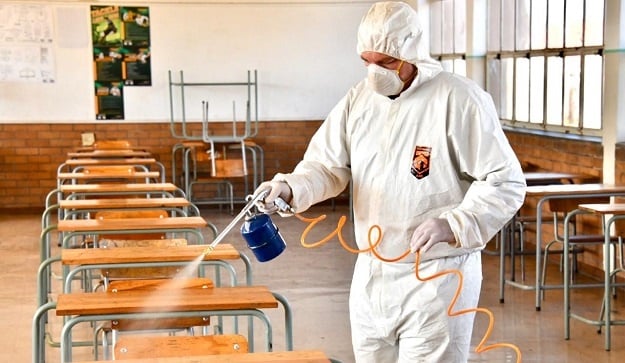


A worker sanitises a classroom.
- 24 pupils have tested positive for Covid-19 at one boarding school in the Alfred Nzo District Municipality.
- Of the 5 037 Eastern Cape schools, 84 are yet to reopen under Level 3.
- Forty have reopened from the 196 schools that were closed.
The Eastern Cape education department was forced to close 196 schools since reopening on 8 June due to Covid-19, with 132 of those still shut, the Office of the Premier has said.
Of the 196, 40 have reopened after they were decontaminated, said spokesperson Mvusiwekhaya Sicwetsha.
He could not explain what the situation was at the remaining 24 schools.
Sicwetsha said the schools, which remained shut, would reopen once three-day screening and contamination had been done.
According to the school readiness assessment report as of 19 June, he added, 5 037 schools were declared ready for reopening, 67 were partially ready and 17 were not ready.
Sicwetsha said at 84 of the 5 037 schools in the province remained closed.
Of these, 14 did not have water, 34 have no functional ablution facilities, and 34 have a shortage of personal protective equipment (PPE) for pupils, while two special needs schools from Alfred Nzo East do not have PPE for support staff.
“The department is working on this matter and will provide updated information,” he added.
On Friday, a secondary school in the Alfred Nzo District reported 24 Covid-19-positive cases after tests were conducted on pupils last week. Those who tested positive attend Makaula Secondary School.
Following the results, a further 253 pupils and 47 support staff were also tested, with teachers expected to be tested on Monday, according to DispatchLive.
Questions sent by News24 to the department’s superintendent-general, Themba Kojana, as well as its spokespersons, Loyiso Pulumani and Malibongwe Mtima, were not answered at the time of publishing.
Sicwetsha announced support for pupils with comorbidities as well as for those without internet connectivity at schools.
ALSO READ | Mpumalanga Education MEC worried about theft of PPE, water shortages in schools
“All schools approached their learner support programmes in line with their contextual and social factors and made use of platforms that are easily accessible to the learners and their parents such as WhatsApp, video calls, voicenotes and SMSes and lessons in hard copy.
“Most schools downloaded support material from the ECDoE website, DBE website, YouTube, Facebook groups and Google Classroom website and provided it in hard copy to learners without online facilities.
“Parents are encouraged to collect their learner support material from their respective schools and, where possible, the lessons are emailed to the parents,” he said.

